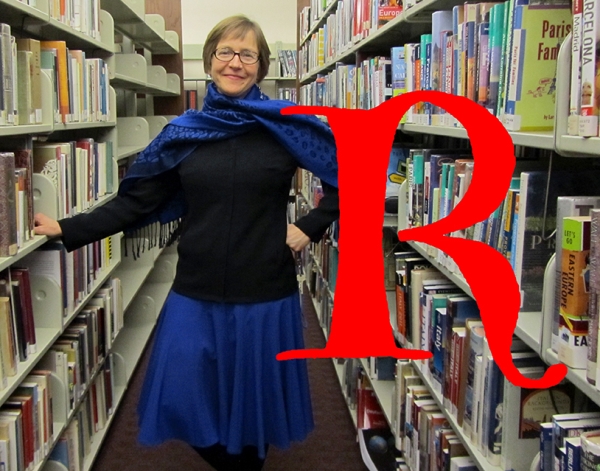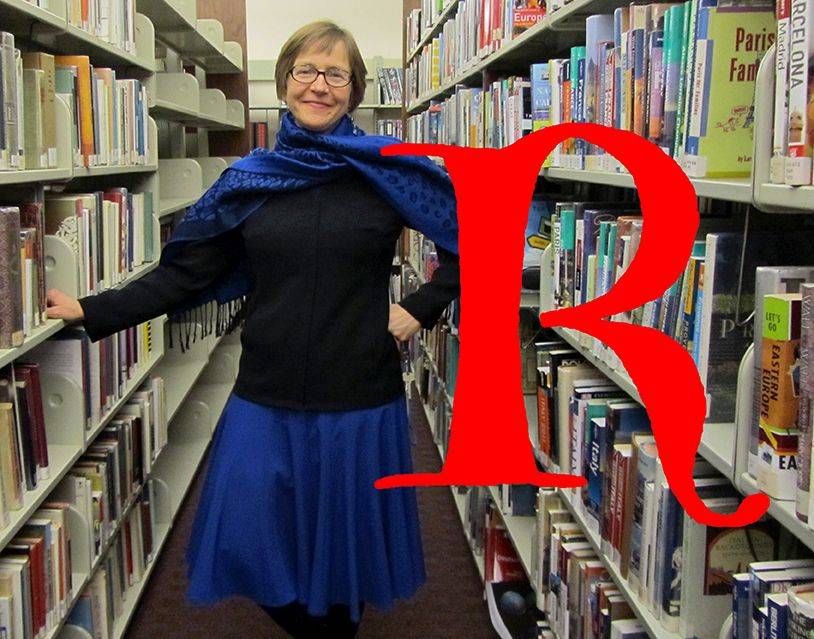 is for Reference Librarian. Don’t let two serious words put you off; whether you’re at dissertation zero hour or looking for just the right Saturday night film for your 11-yr-old, there is a crew of imaginative and interested people roaming library floors throughout Champaign Urbana — ready and yes, eager! — to help you find a grip in this slippery world of information, misinformation, and overload. Find a reason to have a conversation with a Reference Librarian (hereafter affectionately monikered RL); I think you’ll come away with an expanded appreciation of the riches awaiting your curiosity. (And April 13-19 was National Library Week!)
is for Reference Librarian. Don’t let two serious words put you off; whether you’re at dissertation zero hour or looking for just the right Saturday night film for your 11-yr-old, there is a crew of imaginative and interested people roaming library floors throughout Champaign Urbana — ready and yes, eager! — to help you find a grip in this slippery world of information, misinformation, and overload. Find a reason to have a conversation with a Reference Librarian (hereafter affectionately monikered RL); I think you’ll come away with an expanded appreciation of the riches awaiting your curiosity. (And April 13-19 was National Library Week!)
My focus is on Reference, since it’s content and access that are such rare resources in our town. A library is like your brain; use your imagination to expand how you use it, and you will be astounded by what is there, free and available for the taking, much of it 24/7. I’ve had the pleasure of some in-depth conversations with RLs in town in the past weeks and am pleased to sample resources and services here for you, dear reader…
It’s an interesting reality of the human brain that we rarely really know what we’re looking for — and collateral discoveries may be more appealing than the original question. Your RL is trained in the ins and outs of the “reference interview,” whether you’re deep into academia or on the popular end of the spectrum. You may need some fancy statistics to flesh out your research on income variations among PhDs in astrophysics or you may be wondering about an aside in last night’s Colbert Report. An attentive RL will listen carefully all the way through your ramblings to consider each avenue of possibility. And he may then artfully expand the inquiry until you both are satisfied. The approach will vary depending on who is asking and why. A question about groundwater levels in Urbana will require very different information if you’re a homeowner needing flood insurance or a teenager writing a paper on threats to the local aquifer.
Once your question is clarified, your RL is an expert on the specific resources on the shelves or online; how they’re organized; and how to search them effectively. And she will help you weigh the reliability of what you find.
Library resources available to you any time any place are a major part of the hidden wealth you can tap. Are you awake at 3 a.m. suddenly wondering what you might do with that gorgeous leftover yarn? Log in to Zinio digital magazines online with either Urbana Free Library (UFL) or Champaign Public Library (CPL) and download scores of patterns from Interweave Knits. And once you download an entire magazine it’s yours forever. Some choice and pricey ones are there, purchased with your tax dollars. Do you like Audubon, Dwell, The Economist, Esquire, Rolling Stone? Dive in, any time.
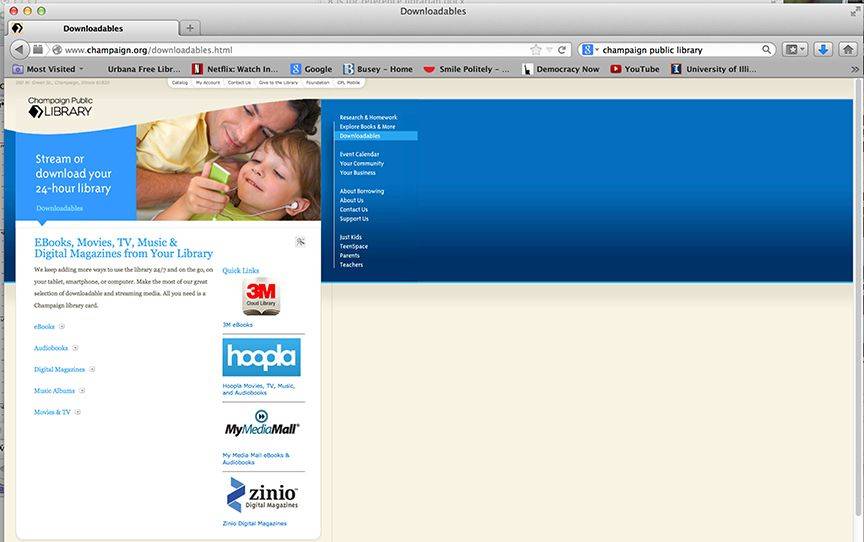
Stumped by how to turn on the defogger of your 2007 Subaru Forester? Log in to Auto Repair Reference Center through the UFL, and the electrical wiring diagrams are there for just about anything you can imagine. Yes, you can search the web on your own but the resources your library offers are high quality and paid for. If you’re in the mood, Mango Languages can boost your facility in Portuguese or Mandarin Chinese. Want to really know everything about a particular Supreme Court case? Don’t mess around with Wikipedia, go straight to the Gale Virtual Reference Library for specialized and fully vetted information.
Explore the links on your library website. Readers’ advisories are a hot topic with RLs; they put considerable energy into blogging about their favorite reads. Are you a Game of Thrones fanatic? CPL has a list of other enticing titles to tickle your fancy. Your kids can check out the homework section on the CPL website. Look through the career planning tools; want to see what the test for firefighters is like? There’s a practice one available. UFL offers specific information about the upcoming and past Ebertfest films.
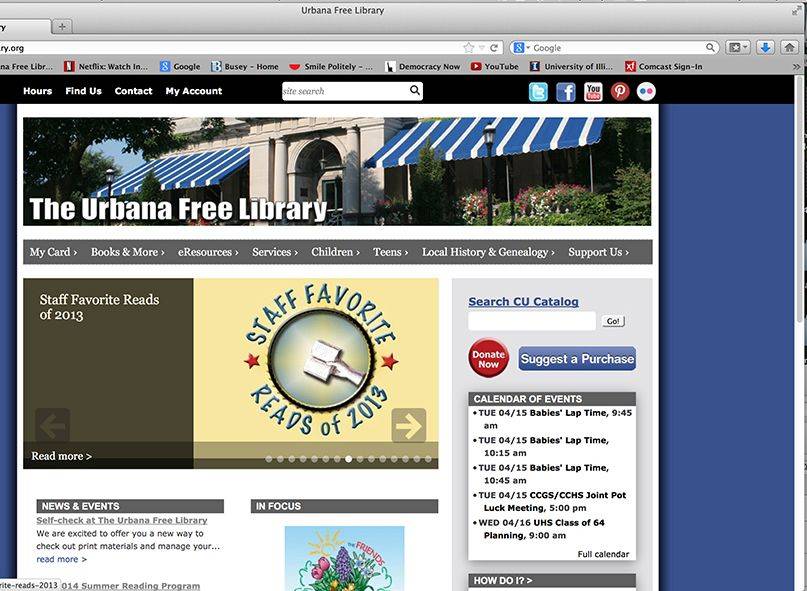
Better yet, visit a library. When I moved to town I was muzzled by a childhood impression that librarians are humorless people who don’t want to be disturbed. Not so, I have been informed expansively by RLs in every library I’ve visited in town. Their joy and mission in life is to serve public need, whether face-to-face, through on-line chat, twitter, email or telephone. Your local RL may look busy doing important things, but she is in fact only keeping busy with other tasks before the next intriguing question or need pops up from a library patron.
Many of our local RLs have their Master of Science degree from GSLIS (pronounce that giss-liss), the Graduate School of Library and Information Science. It may be just down the street, but you should be aware that our school is “consistently named the top library and information science school in the nation.” Its offerings range from fully humanistic to emergent scientific; there you can explore “Digital Humanities” with an expert like Jana Diesner, faculty in our local iSchool. Check it out if you want to know just how cutting edge the U of I is in information sciences. The groundbreaking research at GSLIS percolates directly through their graduates, 250 a year, into our local facilities and your daily library experiences with — yes — your friendly resident RL.
Dan Tracy, on the academic side in the Social Science, Health, & Education Library, is a subject specialist in library and information sciences. He drops in on orientations at GSLIS to be sure students are aware of the range of reference help available. He can be found on the U of I’s own proprietary online chat system, one of the more successful at academic libraries; or during his “embedded office hours,” face-to-face as needed. He enjoys digging deep for specific research interests, including those not-yet-published but hot areas in “grey literature” that require deeper digging. Tracy shows his true dedication to the wider imaginings in town by orchestrating this April Fools’ Edible Book festival on campus.
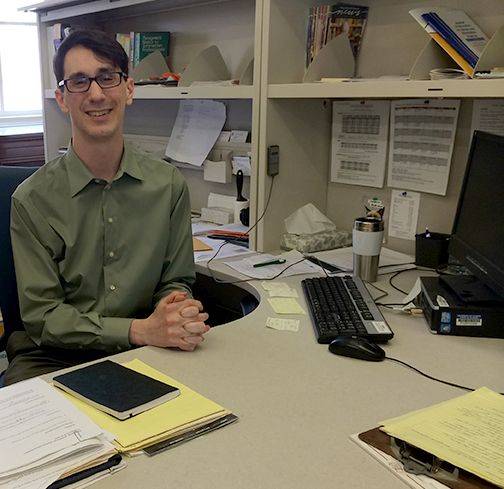
Public libraries are finding themselves hubs of technology and exploding information in ways never imagined by Andrew Carnegie when he provided the seed money to fund 2,509 Carnegie libraries across America. Carnegie set the tone for the American institution, matching wealth and public investment. He wanted to be sure that those less endowed would have access to resources for educating themselves. This public spirit in alive and well today in the expanding maker spaces in our public libraries. The Teen Open Lab at the UFL offers support for film making, 3D printing, creating music, reading, drawing, crafting, gaming, or just hanging out. On May 15 check out Totally Tech at the CPL. If you’re an adult intrigued enough to want to join in, I imagine you’ll be welcome.
On the academic side the Undergraduate Library has raised the idea of digital reference services to a high art. If you’re not familiar with the Media Commons at the Undergraduate Library, I recommend a visit. The collected minds at CITES technology services and the library have assembled the best available to encourage collaboration in digital research and products. There is a “green screen” room, recording and editing facilities, and experts to guide you through their ins and outs. And when you need a break, check out the Gaming Zone.
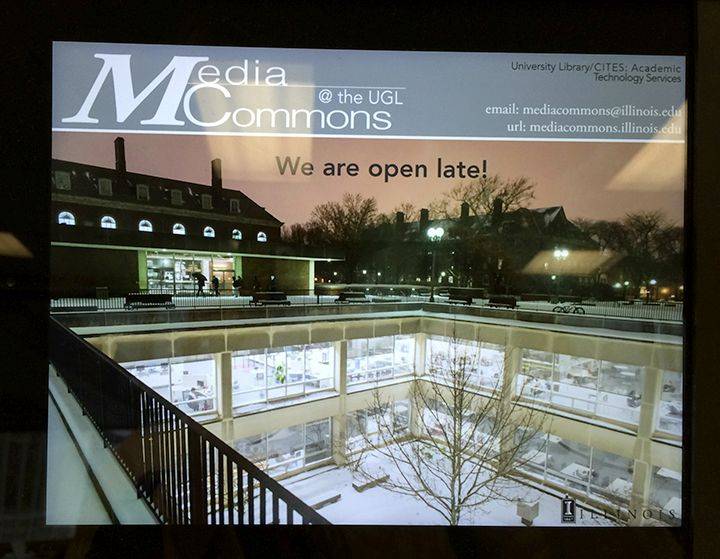
At the UFL “ask me” desk you will often find Carol Inskeep, director of Adult Services. She segued from social work into reference, and makes full use of all her expertise. Inskeep stays on top of what’s hot in local lectures and programs, radio and media, and particular C/U interests such as local food, home brewing, and the current jazz scene. As an RL she keeps tabs on patterns of how books circulate and shapes the collection to fit local interests. She handles downloads of ebooks for the 16 NOOK e-readers the library has ready for loan, and is expert in advising you how to search MyMediaMall to check out books for your own reader.
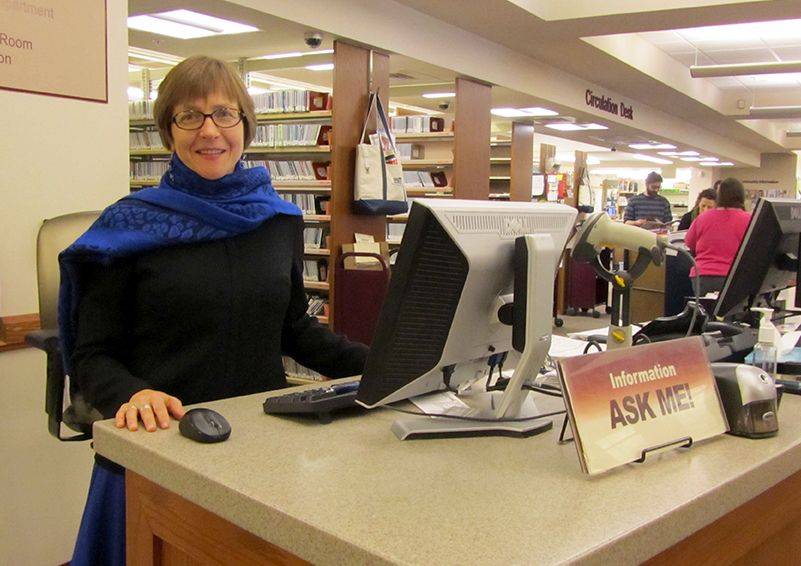
It’s important to Inskeep that users of the reference desk know three things: first: don’t be ashamed to ask any question. Second, the person at the desk truly cares about helping you find the information you need and is ready to go above and beyond to be sure you get it. And third: the person at the desk understands and respects your privacy. People often turn to their library with challenging questions about personal issues like researching a tough medical diagnosis or a legal dilemma like job discrimination or foreclosure on their home. The RL can help you pinpoint exactly what information you need, from carefully evaluated and expensive resources. And you can be assured that questions asked at the reference desk stay there.
Some 13 years ago Kristina Hoerner made her way to GSLIS from a college teaching position in women’s history, and has immersed herself since then in refining and expanding adult services at the CPL. She started in the days when the best local information was provided by notebooks of newspaper clippings, and so she delights in being able to offer the community 50 computers just on the 2nd floor. Looking for an outlet? Check out the raised floor access throughout the magnificent new building — heating, cooling, and wiring are beneath your feet precisely when you need them.
If you’re in need of tech support, make an appointment for a personalized coaching session. Hoerner promises the RLs are ready to help you set up a Facebook page, work on a resume, access films through Hoopla, or get your personal device up and running with all the electronic resources at CPL.
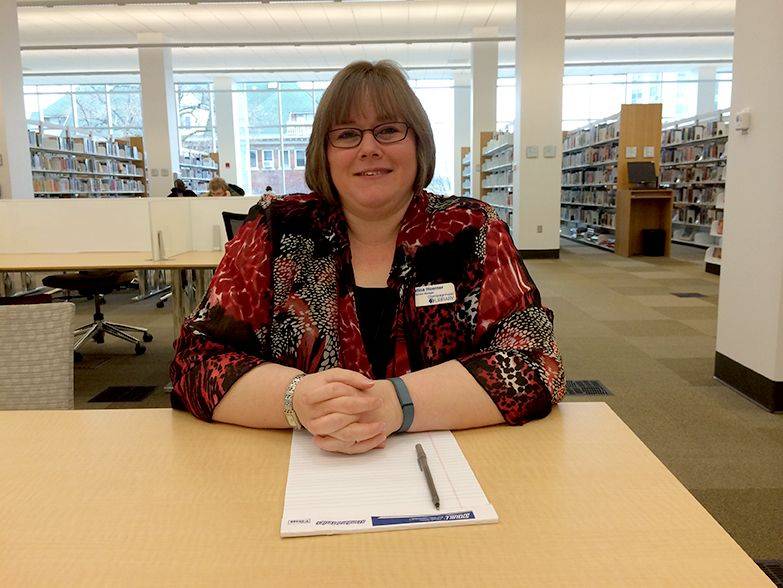
RLs don’t rely on people to approach the information desk. In both Champaign and Urbana, they take shifts doing “roving reference,” walking the floors to see who might be in need of expert assistance.
Children’s reference is a specialty all its own. Kids live in their own universes, and each age brings a different set of reference skills and needs. I spoke with Betty Bush, a former school librarian in Chicago who designed and teaches a class at GSLIS on just this subject. Children can’t get to the library on their own, so access to collections is a particular issue. She is savvy in knowing what helps children at home to make best use of the homework and reference aids on the library’s website. A children’s RL needs to be familiar with reading levels and what topics are under discussion in local classrooms.
Knowing the challenges young students face, Bush describes the ins-and-outs of an “imposed inquiry,” which is a question asked by someone other than the asker. Parents get involved; and a teacher’s assignment may be interpreted differently by different students. It’s not unusual for a children’s librarian to sleuth backward to the source if he hears the same question a number of times — to actually find the teacher and get a copy of the assignment. The RL may help a teacher frame a project so it fits the available resources; or may actually deliver materials to that classroom.
“Readers advisories” for kids can also be impacted by parents’ oversight of what their children read. I’ve been struck by the young adult focus on dystopian fiction; I asked Bush if she’s concerned by the gore and grimness of zombies and vampires, Twilight and Hunger Games. Bush assures me that Grimm’s fairytales and stories of Catholic saints offer as gruesome scenarios as what’s out there today. The next generation may not be plunger deeper than we did into the dark side.
We in Champaign Urbana have the remarkable resource of so many highly trained and dedicated RLs, with the best libraries to back them up. Give yourself an adventure and take a spin through what’s yours for the asking, from the minds, hearts, and collective memories of our local research librarians.
———
The letter R: 18th letter of the Roman alphabet. R most likely evolved from the Egyptian hieroglyph for “head,”
branching both into the Semitic symbol , head or rabbi  ,
,
morphing into through the Phoenician “resh”  ,
,
that reversed into the Greek rho,
and gained a lower leg in western Greek to better distinguish it from P. R is also known as the “dog’s letter,” or littera canina — I read that the Romans liked to trill their “rho” to imitate a growling dog. Thankfully our RLs aren’t similarly inclined.
Cope Cumpston is a typographer, book designer, and community enthusiast resident in Urbana. You can reach her here: cope.c@comcast.net.
The archive of abecedarian C-U lives here:








